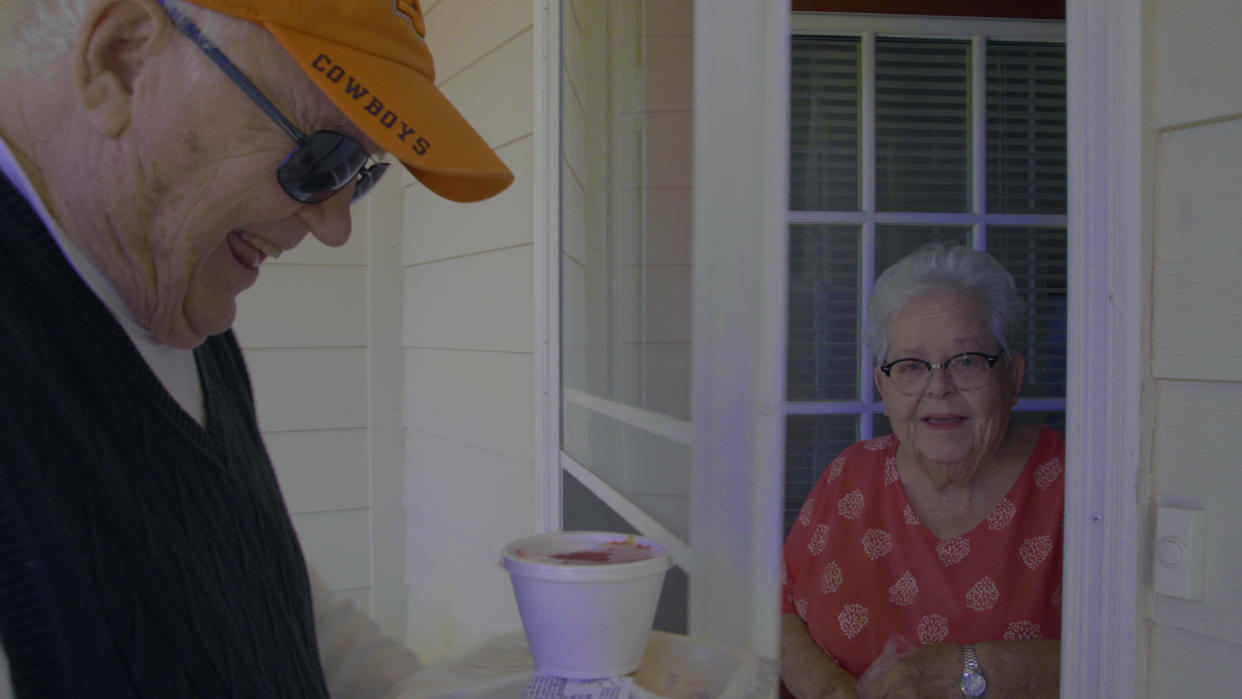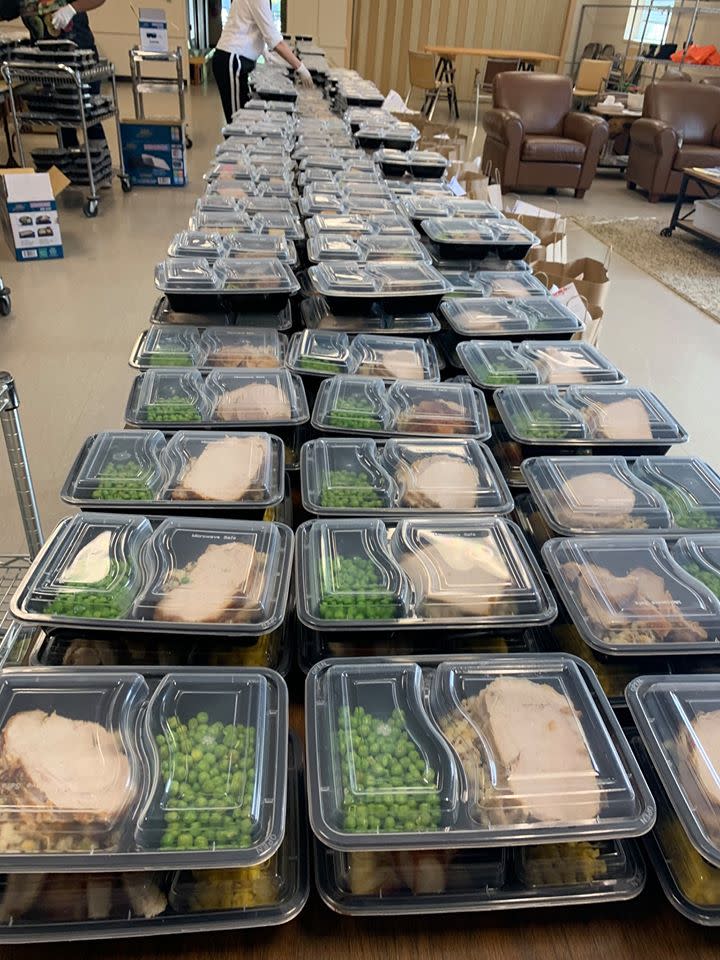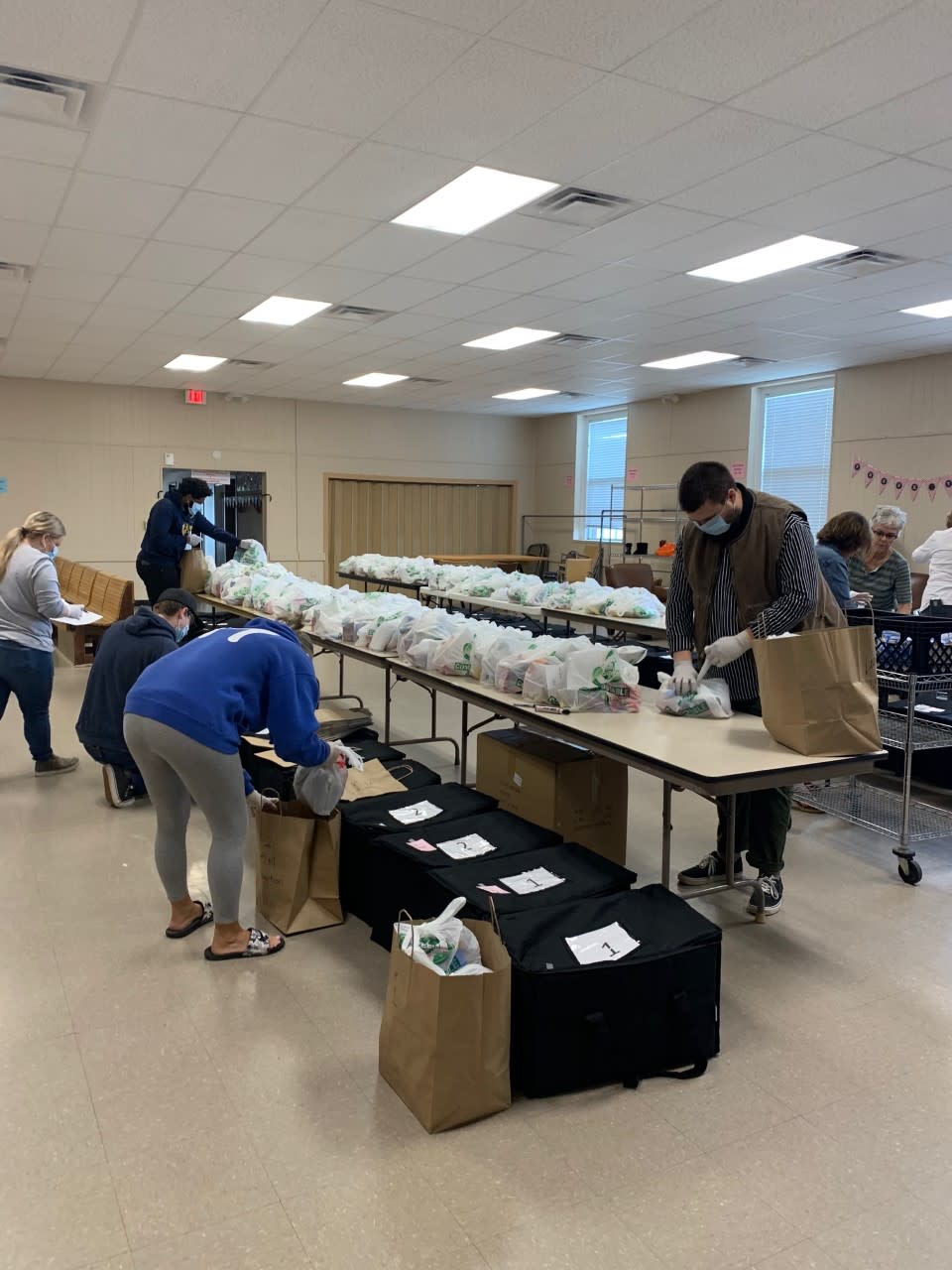Why senior Meals on Wheels volunteers are still delivering during the pandemic: 'The clients give me such joy'

Kaye Poos began volunteering for Mobile Meals — a Meals on Wheels partner based in Edmond, Okla. — in 2008, a couple of years after retiring from the medical profession and “realizing that I needed purpose in my life.” As a volunteer, she helps prepare and deliver meals to area residents who are home-bound, whether due to age or disability. And while that work has changed significantly since the coronavirus pandemic surfaced in the U.S. — deliveries now consist of a weekly drop-off of multiple frozen meals, versus a daily single hot meal — Poos’s commitment to getting isolated folks fed has only deepened.
“Most of our clients are elderly and are the most at risk,” she tells Yahoo Life, adding that serving during the pandemic has been a “challenge,” but one she’s willing to face. “The need for such a program is so great, and the people requiring these services are so wonderful and a prime example of someone needing help after contributing so much to our society in their lifetime.”
Cristi Twenter, executive director of Mobile Meals, says that while the nonprofit organization has had to pivot and take on extra precautions because of the pandemic, its services are needed more than ever due to food insecurity and health concerns. In fact, applications have ticked up, with 35 new clients — people considered home-bound and without a caregiver who can provide at least one meal a day — since March 1. Currently, Mobile Meals is delivering about 1,200 meals per week to 240 individuals in the community; that’s up from 215 meals each weekday, or 1,075 a week. Most of the new arrivals, she says, are senior citizens who are sheltering in place and those with compromised immune systems from chemotherapy, recent surgeries or pre-existing heart and pulmonary conditions. In other words, those especially vulnerable to the complications of COVID-19.
“They’re afraid to get out and go to the grocery store,” Twenter says. “They’re fearful of getting out of their homes and being exposed to the virus.”

The same can be said of some Mobile Meals volunteers, about 90 percent of whom Twenter says are senior citizens themselves. As the organization and other Meals on Wheels programs across the U.S. make adjustments to take on growing demand for meal deliveries while enforcing new safety protocol, it falls on a group considered high-risk to decide whether or not to carry on their volunteer work. Twenter says many senior volunteers have had to step back out of concern for their own health, but others, like Poos, who calls volunteering “an integral part of my life,” are brushing off fears and pressure from loved ones in order to help those in need.
“I’m not really too worried as I think if I keep wearing a mask and gloves I’ll probably be OK,” Landis Legge, an 80-year-old retiree and widower who has been a Mobile Meals volunteer since last fall, tells Yahoo Life. “Not so sure if my children really think that though!”
Mobile Meals is enforcing new safety precautions to keep both volunteers and clients safe. Face masks are worn during meal preparation and deliveries; drivers are also expected to use hand sanitizer, provided by the nonprofit, between deliveries. Volunteers must take their temperature before arriving for a shift; if the reading is 99.5 degrees Fahrenheit or above, a substitute will be found and they’ll need to quarantine for at least two weeks. Volunteers who travel are also subject to a two-week quarantine. The bags in which meals are placed are disinfected after use, and those making deliveries are asked to maintain social distancing by dropping off food on a porch and waiting to make sure it’s picked up rather than going to the door or entering a home.
And to further minimize contact between volunteers and clients, and keep up with demand from its expanded workload, the organization has shifted from delivering freshly made hot meals every weekday to offering a once-a-week drop-off featuring five frozen meals (with sample dishes ranging from parmesan chicken to lasagna), plus side items, fruit and milk, and cold items like sandwiches and salads for those requiring weekend meals.
According to Meals on Wheels America, four out of five Meals on Wheels programs have seen meal requests double since March 1. Some programs are using freezer semi-trailers and donated space to help them supply more frozen meals.
“There is no debate that older Americans have borne the brunt of this pandemic, and if we only examine the infection, hospitalization and death rates, we vastly underestimate the true impact,” said Ellie Hollander, the organization’s president and CEO, says in a press release.
In New York, the Meals on Wheels program at the Bay Ridge Center in Brooklyn is undergoing adjustments of its own, deputy executive director Todd W. Fliedner tells Yahoo Life. While the brick-and-mortar senior citizen center has temporarily shut down due to the pandemic, increased demand for meal deliveries to isolated and home-bound residents has prompted organizers to add a seventh delivery route, clearing its waiting list in the process.
“This is the absolute worst time that people should be without food,” Fliedner says. “Anyone that wants home-delivered meals is getting them.”
He says that the Bay Ridge program is currently serving 700 meals a day, an increase of about 100 from its pre-pandemic norm. Those meals are prepared in-house three days a week, with fresh hot meals being supplemented by frozen and freshly chilled dishes; previously it was a Monday to Friday operation.
While the program is not entirely volunteer-run — delivery staffers are paid minimum wage — Fliedner says workers are primarily “seniors themselves,” many with underlying health conditions. Staffing has therefore been “challenging,” in order to accommodate breaks and doctor-mandated time off while at the same time trying to prepare, assemble and deliver a week’s worth of meals in roughly half the time, with more intense safety precautions in place. In addition to wearing masks and gloves, staffers practice social distancing during deliveries rather than hand them off.

Managing the logistics of increased meal deliveries while enacting new health and sanitization measures to keep crews and clients safe hasn’t been the only challenge during the coronavirus crisis. Social distancing and less frequent deliveries have had an impact on the much-needed connection — a friendly smile, a conversation — home-bound clients have with those who bring their meals.
“It’s the social contact with people that we feel is almost as important as the actual meal,” says Fliedner, adding, “for many of them, this is the only person they’re going to see for their entire day.
“Our drivers and our helpers, even though they observe social distancing, they still try to engage with them and have a conversation,” he continues. “It’s not like, ‘Here’s your food, bye.’ ... We completely understand the social significance of the contact, and unfortunately, it has been compromised by COVID-19, but not entirely.
Some drivers have taken it upon themselves to call and check in on clients they’ve come to know well after years driving the same route. And in Oklahoma, Mobile Meals volunteers who aren’t comfortable carrying on their active kitchen and delivery duties have still been able to contribute by “making friendly calls” to clients, says Twenter. If an isolated resident is in need of groceries or other essential items, for example, a volunteer can pass that information on and a younger staffer will run to the store.
“Those that do live alone completely, don’t have any family, don’t have any support, we know that our daily check-ins with them are very, very important just to keep them connected to humanity,” she says.
“The clients give me such joy,” says Poos. “They are always so grateful, always want to share a story or two.”
“Most of them are really happy that someone comes to see them every day and I kinda love talking anyway,” agrees Legge. He adds that he’s actually grown closer to some clients thanks to having the same delivery route under the new once-a-week process during the pandemic.
“I have gotten to know the clients better so it’s probably a little closer and it’s easier to chat for just a couple of minutes, kind of see if everything is OK with them,” he shares. “Most are not as healthy as I am so it’s worrying to me.”
For the latest coronavirus news and updates, follow along at https://news.yahoo.com/coronavirus. According to experts, people over 60 and those who are immunocompromised continue to be the most at risk. If you have questions, please reference the CDC’s and WHO’s resource guides.
How to maintain your physical and mental health during the pandemic
Taking care of a loved one with COVID-19? Here’s how to stay healthy
Q&A with Dr. Kavita Patel: How to keep your family safe and maintain your mental health
Read more from Yahoo Life:
91-year-old becomes YouTube sensation with backyard fashion shows: 'I feel like a natural star'
Teen befriends elderly neighbor during lockdown by communicating with Post-It notes
FedEx driver surprises girl with cupcakes on her 6th birthday: 'Be kind, especially now'
Want daily lifestyle and wellness news delivered to your inbox? Sign up here for Yahoo Life’s newsletter.



